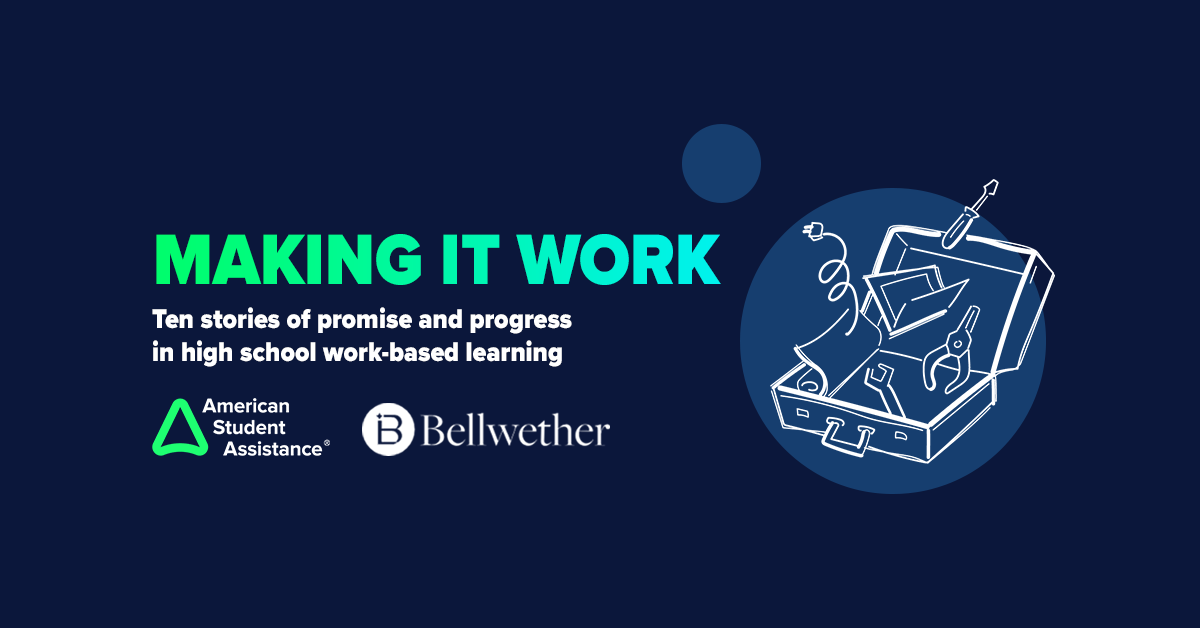The challenge: what’s preventing high school work-based learning from becoming more widespread?
We know from our research at ASA that while 79 percent of high school students would be interested in a work-based learning experience, only 34% were aware of any opportunities for students their age — and just 2% of students had completed a hands-on career learning experience during high school.
In order to facilitate these experiences for young people, we also need employers across a vast array of industries to get on board. The long-term benefits for businesses engaging in high school work-based learning are palpable — the most attractive being an increased pipeline of qualified talent during a time when many industries are suffering from labor shortages.
But thus far, it’s been a challenge to reconcile the need for high school work-based learning with employers willing or able to provide these experiences.
Enter EPIC, a new platform poised to make waves with a grant from ASA.
The U.S. Chamber of Commerce Foundation is taking a bold step towards fostering innovation and collaboration in education and the workforce. With the receipt of a substantial $1.5 million grant from ASA spanning three years, the U.S. Chamber Foundation is poised to launch the pilot phase of the Employer Provided Innovation Challenges (EPIC) initiative.
“EPIC will provide learners with opportunities to work as a team on real-world industry problems that not only promote career awareness, but also career preparation,” said Jason Tyszko, senior vice president at the U.S. Chamber of Commerce Foundation. “We believe that EPIC will seed the infrastructure of the future to scale authentic project-based learning and will one day reach thousands of learners.”
Through 2025, the U.S. Chamber Foundation will organize up to 50 challenges reaching as many as 500 learners, utilizing project management tools and infrastructure, frameworks, and rubrics. Micro-credentialing, such as digital badging and Learning and Employment Records (LERs), will also be designed and tested as a component of this phase. Unlike the traditional business case or entrepreneurship challenge where the focus is on new business creation with a reward, these work-based learning challenges will focus on the development and implementation of new ideas and new ways of doing things that create social value.
This transformative online platform is designed to bridge the gap between education, real-world challenges, and the needs of employers. EPIC promises to revolutionize the way high school students, postsecondary learners, and incumbent workers approach problem-solving, unleashing a new era of practical and experiential learning.
At its core, the EPIC initiative represents a revolutionary way to link education with industry demands. The platform will serve as a conduit, connecting individuals from diverse backgrounds with real-world challenges posed by regional and national partners. These partners encompass a wide spectrum, including industry giants, small and medium-sized enterprises, government agencies, municipalities, and non-profit organizations. By involving employers directly, EPIC ensures that the challenges presented are aligned with the skills and knowledge that are in high demand within the job market.
The EPIC initiative has the potential to unlock a host of benefits for the participants, employers, and the broader educational landscape.
For students and learners, this platform presents a unique opportunity to engage in hands-on problem-solving, contributing their ideas and perspectives to challenges that are actively faced by industries. This practical application of knowledge not only deepens their understanding but also nurtures a sense of creativity and resilience that traditional classrooms often struggle to provide.
Likewise, incumbent workers stand to gain immensely from the EPIC initiative. As industries evolve and transform, the need for upskilling and reskilling has never been more urgent. Through EPIC, workers can access relevant challenges and collaborate with peers and industry professionals, fostering a continuous learning mindset that is crucial in today’s dynamic job market. This synergy between education and professional development helps bridge the gap between theoretical learning and practical application.
Employers, on the other hand, find themselves in a unique position to tap into a diverse pool of talent. The EPIC platform allows employers to crowdsource innovative solutions to their challenges from a wide array of individuals, from students brimming with fresh perspectives to seasoned workers who bring a wealth of experience.
This cross-generational exchange fosters innovation, enables rapid problem-solving, and provides employers with a glimpse into the potential of future employees.
The significance of the EPIC initiative extends beyond its immediate stakeholders. The education sector stands to benefit greatly from the real-world applications offered by the platform. By integrating these challenges into curricula, educational institutions can create a learning environment that prepares students for the complexities of the modern workforce. This integration not only enhances the quality of education but also addresses the longstanding criticism of the gap between academia and industry demands.
As the pilot phase of the EPIC initiative prepares to launch, anticipation runs high. The potential impact of this platform is immeasurable. It holds the promise of nurturing a new generation of innovative thinkers, problem-solvers, and collaborators. Through its seamless connection between education and industry, EPIC serves as a blueprint for a future where learning is not confined to textbooks but extends into the realm of practical challenges and solutions.
With this $1.5 million grant from ASA, the U.S. Chamber Foundation aims to change the landscape of education and workforce development. The EPIC initiative represents a monumental leap towards aligning education with industry needs. By facilitating collaboration between students, learners, and workers with employers, EPIC creates a platform for solving real-world challenges while promoting practical learning, creativity, and innovation.
As the pilot phase of this groundbreaking initiative kicks off, the future of education and workforce development appears brighter and more closely intertwined than ever before.



